|
India's
habit of counting, analyzing and projecting centuries, by conventional
wisdom, owes itself to cricket. But then, The India Today Conclave,
held at Delhi's Taj Palace Hotel on the March 12 and 13, is not
about conventional wisdom. It is, rather, about pondering the questions
others dare not. So here goes. Is this, the 21st, 'India's Century'?
The time had never been more appropriate to
discuss it, as the Editor-in-chief of India Today, Aroon Purie,
made quite clear, before inviting India's Prime Minister Atal Bihari
Vajpayee to start the proceedings.
For his part, Vajpayee preferred to envision
an India just some years away: a developed India by 2020. His three-pronged
strategy: promoting productive employment in all sectors of the
economy; enhancing employability of job-seekers through skill development;
and strengthening social security schemes for those in the unorganised
sector. All of it, he said, would bank on the 'Law of Growth'. The
conditions were well in place, he announced, with a characteristic
flourish-as if to go with a roll of drums for a new dawn.
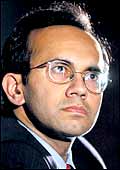 He
set the cat among the pigeons when he wrote a provocative article
in the July-August issue of Foreign Policy entitled 'It's India
Above China In The New World Order'. Tarun Khanna,
Professor of Strategy at Harvard Business School, spoke to
Ashish Gupta on that, and
more. He
set the cat among the pigeons when he wrote a provocative article
in the July-August issue of Foreign Policy entitled 'It's India
Above China In The New World Order'. Tarun Khanna,
Professor of Strategy at Harvard Business School, spoke to
Ashish Gupta on that, and
more.
You have spoke of India overtaking China as a leading
power; why are you so optimistic?
While the two countries had embarked on different strategies
of development and have achieved different rates of growth,
China has discouraged local entrepreneurship in favour of
an FDI-dependent approach; India, on the other hand, has allowed
free enterprise to thrive. In fact, there is much more private
sector initiative in India-be it in advertising, publishing
or NGOs. The real issue isn't where China and India are today,
but where they will be tomorrow.
Any major concerns, though?
Many. For instance, how will India rein in the fiscal deficit?
How will India discipline its political class? Also, India
remains over-regulated compared to other countries at its
per capita income level.
|
Foreign Minister Yashwant Sinha spoke next-on
India's quest for global power, both hard and soft. Managing the
global response was the issue. This could depend on whether India
escapes a failure of political imagination, warned geo-politics
expert Sunil Khilnani, serving a blunt reality check-before advising
the country to deploy its original wit, moral discipline and power
of persuasion to bridge "conflicting interests" and, thus,
redefine the essence of global greatness.
With the hall sufficiently steamed up, Yale
historian Paul Kennedy ran the Conclave through the relevance of
steam-that half-seen natural-turned-manmade source of power-and
free trade to Europe's overthrowing of South Asia as the world's
great economic power some three centuries ago. Was a reversal in
sight? No, not unless India came to grips with the ifs and buts.
Anyhow, it was clear, the economy could not
afford to let the country down again. To industrialist Mukesh Ambani,
India's success was mainly an issue of making the most of the country's
new "tryst with destiny". Exuding an urgent sense of must-do
optimism, Ambani outlined a strategic plan to storm into the G-5
economies within a couple of decades. Services, energy and knowledge-era
competencies, he said, could converge to deliver scorching economic
growth-so long as no opportunity is left untaken, be it healthcare,
tourism, design, entertainment or any other expression of creativity.
What's more, if West Asia was the energy base of the world, there
was no reason India couldn't modernise agriculture to become the
food base of the world- which would ''entail an integrated, high-end,
high investment, high-yield, resource-efficient model of farming".
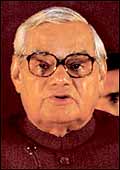 ''The
objective conditions, including the international situation,
have never been more conducive for this Law of Growth to operate
with full power in the case of India." ''The
objective conditions, including the international situation,
have never been more conducive for this Law of Growth to operate
with full power in the case of India."
Atal Bihari Vajpayee,
Prime Minister of India
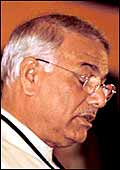 "Like
all matters of international politics, the rise of India will
depend not just on India's actions, but also on how the rest
of the world responds to this development." "Like
all matters of international politics, the rise of India will
depend not just on India's actions, but also on how the rest
of the world responds to this development."
Yashwant
Sinha, Minister of External Affairs
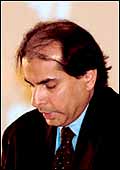 "The
world is attracted by what Bangalore stands for, but repelled
by what Gujarat means." "The
world is attracted by what Bangalore stands for, but repelled
by what Gujarat means."
Sunil
Khilnani, Professor of Politics & Director
of South Asian Studies, John Hopkins University
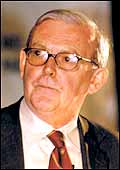 "A
Goldman Sachs report says India will be the third largest
economy by 2050. But three challenges could put the brakes:
Kashmir, energy deficiency and China as a competitor." "A
Goldman Sachs report says India will be the third largest
economy by 2050. But three challenges could put the brakes:
Kashmir, energy deficiency and China as a competitor."
Paul Kennedy,
Yale Professor and renowned historian
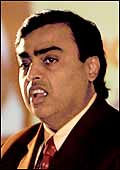 "To
become an intellectual hub, we need a paradigm shift from
deriving the benefits of innovation to driving innovation." "To
become an intellectual hub, we need a paradigm shift from
deriving the benefits of innovation to driving innovation."
Mukesh
Ambani, Chairman & Managing Director, RIL
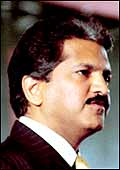 "We
are risk averse and frightened to fail. We love our comfort
zone. We have to be innovative and different." "We
are risk averse and frightened to fail. We love our comfort
zone. We have to be innovative and different."
Anand
Mahindra, Vice-Chairman and MD, Mahindra &
Mahindra
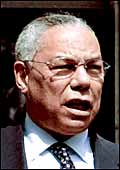 "In
the days ahead, Indo-US relations will be like a Bollywood
blockbuster. There will be twists and turns in the plot, but
there is no doubt it will be a happily-ever-after result for
both countries." "In
the days ahead, Indo-US relations will be like a Bollywood
blockbuster. There will be twists and turns in the plot, but
there is no doubt it will be a happily-ever-after result for
both countries."
Colin
Powell, Secretary of State, USA
|
Chief Economist of the IMF, Raghuram Rajan,
was relatively cautious in his optimism. Given the strength of its
institutions, he said, the country had underperformed badly on most
indicators so far. The good news was that most of India's growth
since 1980 had come from 'total factor productivity', and India
was set for great things ahead. Provided, he cautioned, the country
deals quickly enough with drags such as the fiscal deficit. Beyond
that, he advised, this is an opportune time to get reforms moving
to ease constraints, attract greater investment and further incentivize
growth, which has proven the best antidote to poverty.
With the economy in boom and globalising, it
ought to be just a matter of a few decades that India could boast
of a hundred multinational companies. How could it be done? As of
now, said Harvard B-school professor Tarun Khanna, "Indian
companies can hardly be called global." His three-part recommendation?
"Leverage India's unique strength, embrace your neighbours
and borrow strategically.'' That's the way to go. "If capital
is not available at home," he advised, "tap into the deep
capital markets of the world. If talent is an issue, then learn
to tap into the rest of the world.'' His last suggestion: leverage
India's "under-utilised asset''-the diaspora.
What the government could do, according to
industrialist Anand Mahindra, is provide a 'Tropical Garden environment'.
"The gardener should create the right kind of soil (conducive
environment), ensure that there is adequate water (facilitating
policies), rid it of the weeds (obstacles and bottlenecks) and then,
move out of the way,'' he suggested. The de-weeding could go from
power supply, roads, ports and labour constraints to archaic strictures
on mergers. Further, the quest for economies of scale requires common-market
thinking, and it would help vastly if attitudes on this issue could
be reshaped.
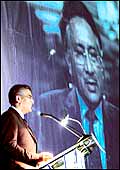 |
| Score check: Aroon Purie, Editor-in-chief,
India Today, and Gen. Pervez Musharraf, President, Pakistan
(on the screen) |
You could say that again, one could almost hear
US Secretary of State Colin Powell think to himself, as he addressed
the Conclave via satellite-on Indo-US ties, with all the 'twists
and turns' in the plot.
India's own governance story, according to
Disinvesment and Communications Minister Arun Shourie, is about
mass empowerment-enabled by the receding of the state as a big part
of people's lives. The state is no longer the growth engine, he
held, but more of a facilitator for private enterprise. But let's
not get cynical about the state, said Delhi University's Deepak
Nayyar. "We have moved from a widespread belief prevalent in
the 1950s that the state does nothing wrong to a strong conviction
in the late 1990s that the state can do nothing right," he
said, "Now, these are caricatures of perceptions."
Thankfully, change is the very word youth defines
itself by-as made evident by young politicians B.J. Panda, who spoke
on the need for youth-driven change, and Mehbooba Mufti, who made
a plea for peace.
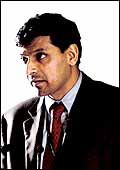 At
40, he is the youngest individual to be IMF's chief economist.
Raghuram Rajan's major works include the recent book
Saving Capitalism from the Capitalists. Excerpts from an interview
with Ashish Gupta. At
40, he is the youngest individual to be IMF's chief economist.
Raghuram Rajan's major works include the recent book
Saving Capitalism from the Capitalists. Excerpts from an interview
with Ashish Gupta.
What is the major problem confronting
US capitalism?
The biggest problem with the US today
is a sense of scepticism with the functioning of the capital
market and with issues of corporate governance.
How do you see the build-up of India's
foreign exchange reserves to nearly $108 billion?
My belief is that India has accumulated
more dollars than is necessary, and it is actually hurting
its growth prospects. It shows two things: that India is not
buying enough from different countries, and not enough investments
are being made.
What are your other concerns about
India's progress?
I am worried about the high fiscal deficit,
the meagre investment both in physical infrastructure (power,
ports and roads) and soft infrastructure (health and education).
|
Mutual understanding, be it the ongoing peace
process with Pakistan or economic reforms, was also a theme played
by Congress Chief Sonia Gandhi. She spoke of the national imperative
to turn the 21st into another Indian century (the 20th already having
been one in "many ways"). "Faster economic growth
is essential," she said, making a case for an open-minded Indian
century, "but this growth must take place in an environment
of social harmony, in an atmosphere of social cohesion."
If hard realism was an issue, S. Krishnaswamy,
Chief of Air Staff, took it to an entirely different sphere, speaking
on India's defence preparedness. We need economic growth, he said,
to gain military muscle. Defence expert Ashley Tellis made a frank
case for allying with the US, given the unlikelihood of matching
its firepower anytime soon. "India should exploit the existing
world order," he advised.
India's soft power, on the other hand, is within
anatomical distance of the global big league-but deploying it effectively
would require another literary revolution in the country, according
Sonny Mehta of Alfred A. Knopf, a global publishing house. Aishwarya
Rai, star of the recent releases Khakee and Chokher Bali, began
with an acknowledgement of her presence as the film industry's 'face',
and spoke of the creative expressions of soft power that could be
projected worldwide to India's unique advantage. "I...I..."
she appeared to hesitate-before exposing her soreness with the media's
half-commital enthusiasm for Bollywood's dreams, and hoping two
things of the audience: a pardon for her nerve, and a take-away
of more than how good she looked.
That was minutes before India's sensational
last-ball cricket win in the Karachi one-dayer. And it was amidst
this "good mood" that Pakistan's President General Pervez
Musharraf addressed the Conclave live via satellite. The topic:
ending half-a-century of Indo-Pak conflict. Yet, questions of where
who stood became supercharged as the Conclave's grand finale, the
interactive session, began to see its jolly conviviality alternate
with grim reality. And the challenge ahead. A dialogue that began
with the K-city of cricket couldn't but veer its way to the K-state
of Kashmir. May hard minds keep whirring for soft solutions.
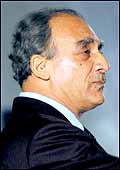 "The
real thing is not to think of reforming the system, but of hacking
away the functions, to transfer function, power and legitimacy
from State structures to society." "The
real thing is not to think of reforming the system, but of hacking
away the functions, to transfer function, power and legitimacy
from State structures to society."
Arun Shourie,
Union Minister of Disinvestment & Communications |
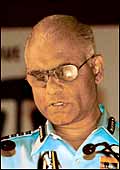 "Vulnerability
tempts aggression. Economic strength is vital to national
security. Economic growth will lead to military growth." "Vulnerability
tempts aggression. Economic strength is vital to national
security. Economic growth will lead to military growth."
S. Krishnaswamy,
Chief of Air Staff
|
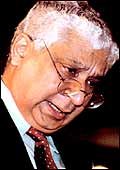 "It
is not possible to build an Indian century if the reality of
the two worlds-India and Bharat-remains unchanged." "It
is not possible to build an Indian century if the reality of
the two worlds-India and Bharat-remains unchanged."
Deepak Nayyar,
Vice Chancellor, Delhi University |
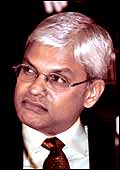 "In
a unipolar world, better relations with the US will help both.
The US is an 800-pound gorilla that has to be entertained." "In
a unipolar world, better relations with the US will help both.
The US is an 800-pound gorilla that has to be entertained."
Ashley
Tellis, Sr Associate, Carnegie Endowment For International
Peace
|
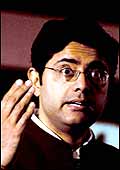 "Let
us not be diffident, I say this to politicians of our generation.
Let us use our mandate to make a difference." "Let
us not be diffident, I say this to politicians of our generation.
Let us use our mandate to make a difference."
B. J. Panda,
Member of Parliament |
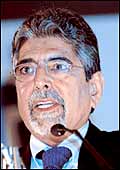 ''Our
soft power is our population. We need to cut costs to make
knowledge affordable to the masses." ''Our
soft power is our population. We need to cut costs to make
knowledge affordable to the masses."
Sonny
Mehta, Editor-in-Chief, Alfred A. Knopf
|
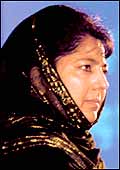 "We
have to translate fault lines of conflict into silver lining
of peace, change borders of hostility into bridges of trust
and cooperation." "We
have to translate fault lines of conflict into silver lining
of peace, change borders of hostility into bridges of trust
and cooperation."
Mehbooba
Mufti, Vice-president, People's Democratic Party |
 "Our
soft power is not just films, but also media, language, music
and fashion. We need to harness all these." "Our
soft power is not just films, but also media, language, music
and fashion. We need to harness all these."
Aishwarya
Rai, Film Actor |
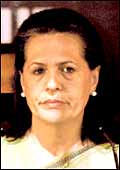 "The
closing of the Indian mind is simply not compatible with the
opening of the Indian economy." "The
closing of the Indian mind is simply not compatible with the
opening of the Indian economy."
Sonia Gandhi,
Congress President and the Leader of the Opposition in the Lok
Sabha |
|
|
